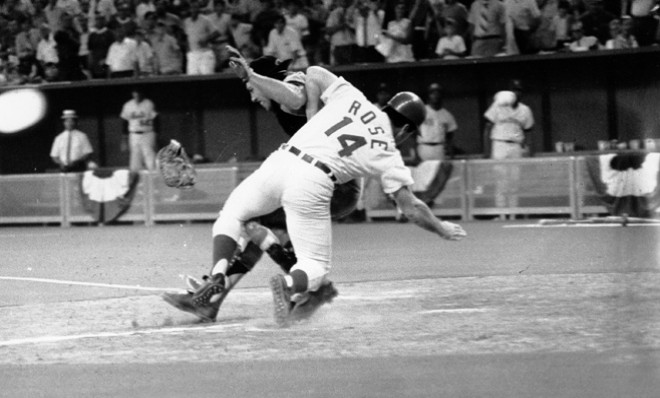Major League Baseball's egregious failure to protect catchers
The NFL has essentially banned injury-making helmet-to-helmet tackles. It's time baseball did the same with violent home-plate collisions


A free daily email with the biggest news stories of the day – and the best features from TheWeek.com
You are now subscribed
Your newsletter sign-up was successful
Major League Baseball, more than any other major American pro sports league, prides itself on a rigid adherence to tradition. While that nostalgia is fine when it comes to honoring the game's rich history, it too often results in the league steadfastly resisting commonsense modernization.
A rather infamous example: In recent years, MLB fiercely resisted calls for in-game replays long after they'd been adopted by other pro sports. The NFL began using instant replay in 1986, with the NHL following suit in 1991, and the NBA doing the same a decade later. In 2008, MLB finally instituted replays — but only for disputed home runs. The league has continued to oppose expanded use for fear it would erode some make-believe idealized purity of the game.
This same debate is now playing out in the discussion over home-plate collisions, the dangerous (and legal) practice of runners plowing into catchers on close plays at the plate in an attempt to make the catcher drop the ball, preventing an out. For years, the league has fended off efforts to address the issue. But now, following a string of gruesome injuries, and with prominent ex-catchers speaking out, it really is time for MLB to take action.
The Week
Escape your echo chamber. Get the facts behind the news, plus analysis from multiple perspectives.

Sign up for The Week's Free Newsletters
From our morning news briefing to a weekly Good News Newsletter, get the best of The Week delivered directly to your inbox.
From our morning news briefing to a weekly Good News Newsletter, get the best of The Week delivered directly to your inbox.
Many catchers caught off guard and off balance have sustained concussions, broken bones, and torn ligaments. One player nearly died from internal bleeding and a shattered shoulder.
Fanatical competitor Pete Rose notoriously charged through Ray Fosse to score the winning run in the 1970 All-Star game. The impact separated Fosse's shoulder, and is widely cited as the reason his career sputtered afterward. More recently, Cleveland catcher Carlos Santana had to be carted off the field after a 2010 collision badly strained his lateral collateral ligament and ended his rookie season.
Calls for a rule change didn't gain steam until 2011, when Buster Posey, San Francisco's budding star and last year's National League MVP, broke his leg and shredded ligaments in his ankle in a horrific collision that left him crawling around the plate, screaming in pain. Within days, Houston's Humberto Quintero sprained his ankle protecting the plate, and Pittsburgh's Ryan Doumit fractured his ankle while doing the same.
Following those incidents, Posey's manager, former catcher Bruce Bochy, embarked on a seemingly quixotic mission of lobbying for the creation of a safe zone around defenseless catchers. Bochy's pleas went unheeded. Joe Torre, the league's point man for on-field rules changes and a former catcher himself, pushed back hard against the idea.
A free daily email with the biggest news stories of the day – and the best features from TheWeek.com
"I really haven't heard anything that would encourage me to change anything or recommend a change," he told the Mercury News at the time. "Being a catcher for a lot of years, I knew what the consequences were.”
But this year, with Bochy and others still pushing the issue, Torre is beginning to sound marginally more amenable, though still far from enthusiastic.
"If something is going to make the game safer and not affect the way the game is played, I'm certainly all for it," he told the San Francisco Chronicle. "I really haven't heard that thing that would make us change."
Maybe Torre's stance will soften again, as yet another prominent retired catcher, Cardinals manager Mike Matheny, came out this week in favor of a rule change. Matheny adding his voice to the effort is significant, as his own career was cut short due to post-concussion symptoms caused by home-plate collisions. In a nod to baseball purists, Matheny said he considers himself an old-school player. However, he noted, baseball "isn't a collision sport."
The NFL, after a spate of concussions that fueled a fear of future legal retribution, has moved swiftly to amend its rulebook to eliminate dangerous helmet-first tackles. Some players initially scoffed that the change would soften the game, but it has clearly increased safety without decreasing the game's quality or alienating fans. There's no reason baseball couldn't do the same.
Baseball, steeped in nostalgia as it is, has consistently dragged its feet on modernization. With a simple tweak to the rules, close plays at the plate could still exist without the constant threat of serious injury. The league should recognize this and focus less on the game's past and more on its present, especially when that means taking small steps to make the game safer.
Jon Terbush is an associate editor at TheWeek.com covering politics, sports, and other things he finds interesting. He has previously written for Talking Points Memo, Raw Story, and Business Insider.
-
 6 of the world’s most accessible destinations
6 of the world’s most accessible destinationsThe Week Recommends Experience all of Berlin, Singapore and Sydney
-
 How the FCC’s ‘equal time’ rule works
How the FCC’s ‘equal time’ rule worksIn the Spotlight The law is at the heart of the Colbert-CBS conflict
-
 What is the endgame in the DHS shutdown?
What is the endgame in the DHS shutdown?Today’s Big Question Democrats want to rein in ICE’s immigration crackdown
